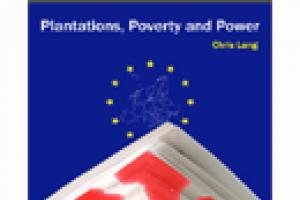As we reported in October 2009, the Korean steel company POSCO has been granted the opportunity both in India and in Uruguay to occupy territory that is valued by the inhabitants of both countries.
Uruguay
Other information
29 June 2010
Over the last few years, Uruguay has gained international attention as a result of the drawn-out conflict with Argentina over plans for the installation of two “mega” pulp mills in Uruguay, one by the Finnish company Botnia and the other by ENCE of Spain.
Other information
30 January 2010
Everywhere in the world where large-scale monoculture tree plantations are established, their arrival is preceded by a series of promises used to trick the local population into welcoming these ventures. After a few years have gone by, people start to realize that these promises are not being kept, and that things are actually even worse than before. But by then it is too late. The companies have taken over the area and set up their plantations.
Bulletin articles
30 October 2009
Uruguay and the Republic of Korea have recently signed an Agreement for Investment Promotion and Protection which, according to Uruguayan government authorities establishes a framework for Korean investment in Uruguay. From past experience in Uruguay, the establishment of a framework for investment in this country may mean reducing or eliminating all taxation, granting of foreign trade zone permits and all kinds of support to the company’s enterprises.
Other information
29 June 2009
Monoculture tree plantations continue to advance over the Uruguayan grasslands and now occupy almost one million hectares of land that was previously assigned to the production of food.
Other information
27 February 2009
In Uruguay at the end of the forties, the State promoted an exemplary initiative, the creation of the National Settlement Institute (Instituto Nacional de Colonización - INC), that arose from the need for a “suitable instrument to promote a rational subdivision of land and its appropriate exploitation in order to achieve the settlement and welfare of rural workers, thus promoting an increase and improvement in farm production.”
Publications
18 December 2008
By Chris Lang
Bulletin articles
25 November 2008
In spite of all the scientific evidence existing on the negative impacts of large scale monoculture tree plantations, the Climate Change Convention insists on promoting them under the false argument that plantations can alleviate the effects of climate change, acting as “carbon sinks.”
Other information
17 September 2007
In Uruguay we have entered the 21st century as witnesses to the transformation of the landscape throughout the length and breadth of the country. Plantations of eucalyptus and pine trees seem to have invaded every type of terrain. This geographical transformation has also had a direct social impact, affecting numerous aspects of life.
Bulletin articles
18 July 2007
With this issue, the WRM bulletin reaches its tenth year. This anniversary provides an opportunity to give visibility to the numerous people who, in one way or another have made it possible – month by month and year after year – to issue the bulletin.
Bulletin articles
23 May 2007
On April 26, the Swedish Royal Academy of Agriculture and Forestry organized in Stockholm the seminar “Tilting forest industries from North to South”, aimed at discussing the growing tendency of the Swedish tree plantations and pulp industry to invest in Southern Countries such as Brazil, Uruguay and Indonesia.
Bulletin articles
23 May 2007
Botnia is currently building the world's most controversial pulp mill at Fray Bentos in Uruguay. It is doing so with hundreds of millions of tax payers' dollars funnelled through the World Bank, the Finnish export credit agency and the Nordic Investment Bank. The profits produced, along with the pulp, will be exported.

